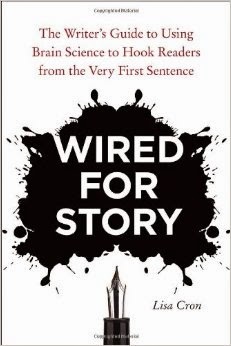

Anna Nordeman
IWSG - Insecure Writer's Support Group for November 2014
This is my ninteenth post for IWSG. Please read my 'news blurbs' after my main topic:
My main topic:
As I have mentioned earlier, I am so pleased to have discovered Roz Morris' how-to-write books (the Nail Your Novel-series), but am still open to reading other advice-for-writers-books.
And when I noticed words of praise for Roz Morris' book by author Lisa Cron, I figured if she likes Roz Morris' ideas, maybe she has some good ideas of her own. My instincts proved to be right. I have almost finished reading Lisa Cron's how-to-write book, Wired for Story, The Writer's Guide to Using Brain Science to Hook Readers from the Very First Sentence. It is a joy to read.
It sticks holes in many myths about writing and basically explains why stories are essential to our survival as human beings. Telling stories is one of the things that makes us different from other species; it makes us human, even more than our opposing thumbs. Why? Because our brains are 'wired' for story, we think better in terms of story; we need to have an emotional connection when learning; we need to see a pattern and to follow a logical cause-and-effect reasoning. Stories make us sit up and pay attention to important information that could save our lives. Good stories help us to think about how we could solve problems in the future, by letting us see examples of what can go wrong for other people -- without us being in any real danger ourselves.
According to Lisa Cron, if you want to be a successful author (whose work people actually read), telling a good story is more important than writing well. Many books to help author-wannabees, concentrate on grammar usage and correct metaphors, but don't explain what a good story really is.
A key phrase in Lisa Cron's book is "information on a need-to-know basis". Our brains cannot retain more information than just four thoughts at a time. You shouldn't pack your novel with a lot of unnecessary information that takes the reader away from the main story and does not have anything to do with the protagonist or the problems that the protagonist must deal with or solve. Lisa Cron uses brain research and examples from literature and films to helps us understand how to tell a good story. (See pages 220ff.)
Lisa Cron's book, Wired for Story, lives up to its message. It is thought-provoking as well as thoroughly entertaining and fun to read; a non-fiction work that is a page-turner.
Examples of new light on old myths about writing from Lisa Cron's book:
MYTH: "Show, Don't Tell" is Literal --
Don't tell Me John is Sad, Show Him Crying
--
REALITY: "Show, Don't Tell" is Figurative --
Don't Tell Me John is Sad, Show Me Why He's Sad
----
MYTH: Writers Are Rebels Who Were Born to Break the Rules
--
REALITY: Successful Writers Follow the Damn Rules
-------
The End
News blurbs:
*
November means NaNoWriMo for many of us writer-wannabees. Last year
(2013), I did not even attempt to use NaNoWriMo to write a novel. This
spring I started writing notes on index cards using Roz Morris'
suggested methods (Read about Roz' how-to write-books here.) This year, thanks to Roz, I do have an outline to follow, so my chances are slightly better. But
I still have the problem of looking for a part-time job and listing new
items for my shops. Plus two school-aged children to rear. If time
could be purchased in a jar, I would probably be cuing up to the counter
to buy it.
 |
| My son, Erik, Maria (friend) & my daughter, Elisabet |
* Halloween came and went in a swoosh. If you are curious about how my children, Erik and Elisabet (12 and 10 years of age) celebrated this curiously foreign holiday here in Sweden, take a look at the photos here. We had everything but candy-corn, which I miss, and I didn't bother with a pumpkin-jack-o-lantern, even though tiny pumpkins are sold here too.
.jpg) |
| Daughter and Father |
* November first was my dear sweet father's birthday. He would have been 97 years old. I think of him often, especially when I read and write. I wish that I could talk to him about the books I read or the films that I see. He might have liked the Downton Abbey-series, that I only recently discovered on http://www.swefilmer.com. Since he was born in 1917, it covers a period (1912 to 1924) that he loved. Daddy was very much interested in WWI and its impact upon society; how it changed the way people lived and thought.
Daddy loved England. He was sent there when he was drafted into the US army during WWII.
He was impressed with land itself, and the ordinary English people. He
loved the culture and traditions. And he was seeing them at a time when
they were perhaps not at their best. Or maybe they were. Maybe World War
II brought out the best in them, or at least in some of them. Of all of the organisations to help soldiers, a long way from home, he thought that the Salvation Army in England did the best job. This is my little tribute to my father's memory and to all of you wonderful people in the UK.
Best wishes,
Anna


